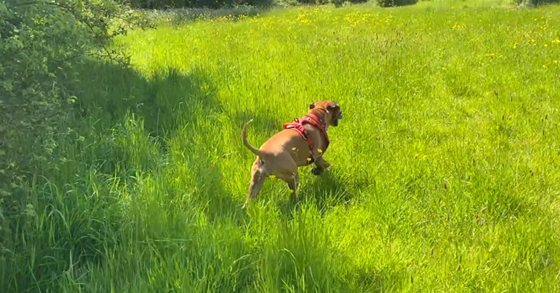Man’s best friend? But once off the leash… it can be a different story!
If they’re let loose, off the lead, where they wander off the established footpaths. Once you start noticing, you begin to see many patches of flattened and trampled vegetation for four or five metres either side of the established footpaths. Some of these are also the habitat for important wildlife habitat, and the wildlife it supports. The dog is having a whale of a time… but other creatures probably don’t appreciate being crushed or trampled on.
Estimates of the UK dog population are at least 10 million, and that number has been rising in recent years. So, their environmental paw-print has been getting worse.
Dogs will be sniffing the ground, their eyes will fix on birds on the shoreline, pause for a moment to zero-in on the target, then shoot off towards their prey. Then you hear the bird alarm calls, and the birds start to really kick-off!
There’s a potential conflict over all this, because as a dog owner, part of me thought “This is exciting, this is what dogs do!”
And seeing the dog getting back to its old hunting instincts is the reason why we domesticated dogs in the first place. It was precisely because of these skills. It seems slightly odd to condemn them for that in the 21st century. But of course it’s often the owner, not the dog, that is the issue.
But the River Thames and mudflats, which are next to the footpath, are designated as ‘Sites of Metropolitan Interest for Nature Conservation’. As such its importance is not only to our borough, but to the whole of London. It has been so designated for a reason: to protect our valuable wildlife habitats and the species that live off them. The mudflats along the riverside footpath are important overwintering habitats for ducks and other wading birds. Energy reserves that they need to see them through the winter, are used up to escape dogs which are let off the leash. Much is made of the laudable conservation efforts on Barking Riverside, but it seems odd to allow roaming dogs off the leash. And on Bank Holiday weekends, the number of dogs off the leash can rise significantly.
Wildlife doesn’t have to be physically chased to be harmed. A study from Canada, published in the Journal of Animal Ecology, showed that exposing pregnant rabbits to dogs made them more likely to abort. The animals weren’t even chased, or even barked at. But just being able to smell or see a dog for a few minutes every day was enough…
It’s not just the dogs, but what they leave behind that can be a problem. Their faeces and urine can add excess nutrients to the soil. The wild plants can’t compete with the grasses that thrive on those nutrients, and they become lost from the habitat. The dog mess is changing the chemistry of the soil too, and it means we’re losing some of those scarce and wild plants that we need. If you look at the knock-on effects of that, it means that butterflies that would be feeding on those wild flowers, will also be adversely affected.
The charity ‘Keep Britain Tidy’ has estimated that 884 tonnes of dog poo is deposited among the parks and green spaces every day! Much of it is picked up in plastic bags and put in municipal bins, from where it either goes to landfill… or incineration..! Both are unsustainable, and incineration of the plastic bags can release toxins from the burning process. Mitigation measures are put in place at these incinerator facilities, and there are attempts to control airborne pollution, but there’s no guarantee toxic fumes will not be released. Fortunately, plant-based bags are available which do not give off chemicals.
Train your dog. Keep your dog on a lead, pick up your dog’s poo, and dispose of that responsibly!
By Kevin Hudson
Local resident and REB member




